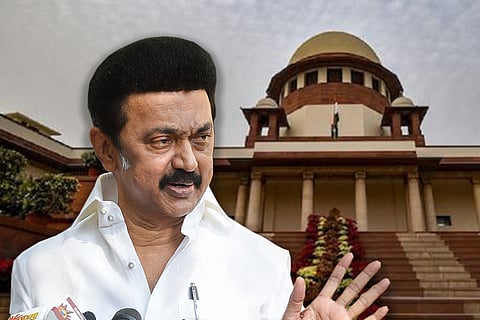

The Dravida Munnetra Kazhagam (DMK) has filed an additional affidavit in the Supreme Court, opposing the Citizenship (Amendment) Act of 2019 (CAA) on Tuesday, November 28, stating that the Act goes against the secular fabric of India. The CAA seeks to fast-track citizenship for persecuted minority groups in Pakistan, Bangladesh, and Afghanistan. The six minority groups that have been identified by the Act for this purpose are Hindus, Jains, Sikhs, Buddhists, Christians, and Parsis. Citing that this excludes Muslims as well as religious minorities like the Tamils of Indian origin who have fled from Sri Lanka and are currently refugees in India, the DMK argues that the Act introduces a completely new ground for the determination of citizenship and goes against the secular ideals of our country.
The affidavit filed by RS Bharati, the organising secretary of the DMK, submits that the CAA is unconstitutional and must be declared null and void since it violates Articles 14 (right to equality) and 21 (right to protection of life and personal liberty) of the Constitution.
Arguing for the rights of the Tamil refugees settled in India, the affidavit details the long history of tensions between Sinhalese and Tamil populations of Sri Lanka. Sri Lanka has two kinds of Tamil populations – Sri Lankan Tamils and Indian Tamils. The Indian Tamils were introduced to Ceylon (olden day Sri Lanka) between 1852 and the 1930s by the British as bonded labourers.
Clause 9 of the Sri Lankan Constitution itself gives utmost importance to Buddhism over all other religions and empowers the state to protect and foster Buddhism. The basis of the inclusion of Pakistan, Afghanistan, and Bangladesh in the purview of the CAA is that their Constitutions provide for a specific state religion, leading to the prosecution of other religious minorities. DMK’s affidavit points out that the situation of Indian Tamils in Sri Lanka is akin to that of the persecuted minorities in these countries. “Not only have the Indian Tamils faced religious persecution because they were predominantly Hindu, they have always been prosecuted because of their minority status since the independence of Ceylon from the British,” reads the affidavit.
A large population of the Indian Tamils has therefore been disenfranchised because it is difficult for them to prove that they are the descendants of people born in Sri Lanka due to the lack of documents, coupled with the oppressive social circumstances they have had to endure.
The DMK’s affidavit contextualises the situation of the Indian Tamils in Sri Lanka to argue that the CAA excludes the struggles of the Sri Lankan Tamil refugees residing in Tamil Nadu, who are unable to avail citizenship in India. The affidavit also underlines that Muslims in several countries have also been similarly kept away from the provisions of the Act, which is discriminatory and manifestly arbitrary.
Citing these aspects, the affidavit points out that one crore residents of Tamil Nadu had previously signed a representation opposing the CAA, which was presented by the DMK party before the President, seeking to repeal the CAA. The affidavit emphasises that the people of Tamil Nadu have spoken their mind, and that the Supreme court must declare the CAA published in the Government Gazette on December 12, 2019, as unconstitutional, and therefore null.